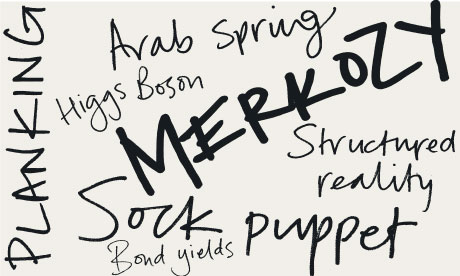Been duped by a 'sock puppet' is? Had a go at 'planking'? Living in a 'structured reality'? 2011 threw up some new words and concepts – and here they are explained

What everyone was talking about in 2011. Photograph: guardian.co.uk
2011 was a hectic year – so hectic it required its own language. Phrases such as "Lulzsec", "phone hacking" and "Wendi Deng" suddenly became common currency. But why hasn't anyone printed a handy cut-out-and-keep handbook explaining what all this stuff means? Well, actually, they have. And you're already reading it. Shut up and keep going as we start our guide to the Buzzwords of 2011.
Christ. Imagine if that was your life.
But it isn't your life. You're just watching it. And when you tune in to a structured-reality show you, the viewer, are actively choosing to spend 60 minutes watching a glossy-looking soap opera performed by non-actors half-improvising a non-script. It's precisely like a scene from an old-school porn film in which a plumber and a frustrated housewife trade clunky dialogue, but with better lighting and no onscreen sex. Speaking of which …
Ever since Ben Affleck and Jennifer Lopez were rechristened "Bennifer" (100 years ago, in 1982), any two proximate individuals appearing in a newspaper must have their names combined by law. Sometimes it catches on ("Brangelina") and sometimes it sorta catches on (eg Big Brother twins "Samanda"; famous until toppled by "Jedward"), but it's rarely used in broadsheets (referring to "the killings of Frose West" is expressly forbidden by the Guardian's style guide).
"Merkozy", however, was a fun nickname even the driest business news section could print without blushing (although in the case of the FT it was hard to tell).
What did "Merkozy" actually mean? Nothing. But it provided light relief from all that depressing stuff about bond yields. Speaking of which …
If something can't be described in plain English, maybe you shouldn't base an entire society on it. Just saying. As it is, the whole thing's been a pointless endeavour. Speaking of which …
Recently killed plankers whose bodies hadn't been carted away yet could always save face by pretending to have invented "stiffing" – lying on the ground being authentically dead. Sadly stiffing failed to take off as a meme until Muammar Gaddafi did it in October, creating front-page news in the process. If only he'd found a way to monetise the craze, he'd have been loaded. But he didn't. Because he was dead. Speaking of which …
It was as if these Arab despots had only just landed on the planet, like the intergalactic megabaddies from Superman II, and the news was playing catchup. We didn't know their names or what they looked like, or have much of a clue as to why they were unpopular – unless, like megabaddie Colonel Gaddafi, they'd previously done something awful to us, in which case we'd not only cheer from the sidelines, but also lend air support.
Basically, in terms of narrative, things hadn't been set up clearly enough during the first act. Come on, news: you really must try harder to explain this stuff. Speaking of which …
Like all complex scientific concepts, I find it hard to grasp for more than three minutes at a time. You can explain it to me, and I'll understand it, really I will, but the moment you walk away, the knowledge starts invisibly drifting out of my head. I call this mysterious phenomenon by which I shift from ignorance to enlightenment, and then back to ignorance – the Brooker Gap. When are scientists going to look into that phenomenon, hmm?
Sock puppet
Stop thinking about actual sock puppets with buttons for eyes and so on. We're talking about internet "sock puppets" here: in other words, people pretending to be someone else on the internet in order to win an argument – or, in the case of Amina Arraf, Syrian lesbian blogger, to further a cause. Amina's blog was held up as an inspiration – until "she" was revealed to be a 40-year-old student from the University of Edinburgh. Adding to the confusion, days later, one of the editors of a lesbian website that had promoted Amina's blog also turned out to be a man. It was a bit like the end of Some Like it Hot. Some began to suspect that lesbians, like leprechauns, might not actually exist at all. Fortunately, Channel 5 soon scotched these rumours with a docusoap set in a lesbian bar. Speaking of which …Structured reality
Once upon a time we had docusoaps. Now we have The Only Way is Essex, Made in Chelsea and Desperate Scousewives … and what do they have in common? No, apart from that. That's right! They're all "structured reality" shows. "Structured reality" essentially means "not quite real": the people featured in the show are actual people, with actual thoughts and feelings and relationships and kidneys and anuses and so on, but the situations they find themselves in for the purposes of the show are slightly massaged into position by the producers. In other words, they're told to stand in a particular spot and toss a glass of wine over their boyfriend because he cheated on them in last week's episode.Christ. Imagine if that was your life.
But it isn't your life. You're just watching it. And when you tune in to a structured-reality show you, the viewer, are actively choosing to spend 60 minutes watching a glossy-looking soap opera performed by non-actors half-improvising a non-script. It's precisely like a scene from an old-school porn film in which a plumber and a frustrated housewife trade clunky dialogue, but with better lighting and no onscreen sex. Speaking of which …
Merkozy
Throughout the latter part of the year, every economist was debating one issue: would the eurozone collapse? Or crumble? Or meltdown and dribble into an abyss? No one could decide which combination of words best described the inevitable impending disaster. Eventually they gave up and simply started screaming. In a bid to distract them, German chancellor Angela Merkel and French president Nicolas Sarkozy stood beside each other at press conferences and made reassuring cooing noises.Ever since Ben Affleck and Jennifer Lopez were rechristened "Bennifer" (100 years ago, in 1982), any two proximate individuals appearing in a newspaper must have their names combined by law. Sometimes it catches on ("Brangelina") and sometimes it sorta catches on (eg Big Brother twins "Samanda"; famous until toppled by "Jedward"), but it's rarely used in broadsheets (referring to "the killings of Frose West" is expressly forbidden by the Guardian's style guide).
"Merkozy", however, was a fun nickname even the driest business news section could print without blushing (although in the case of the FT it was hard to tell).
What did "Merkozy" actually mean? Nothing. But it provided light relief from all that depressing stuff about bond yields. Speaking of which …
Bond yields
Approximately 10,000 cryptic economic phrases suddenly popped up in news reports this year, nonchalantly bandied about as if the viewer knew what they meant. It was all "bond yield" this and "sovereign debt" that. Impenetrable. At one point, numbers were given "haircuts". That's like something out of Lucy in the Sky with Diamonds or a Spike Milligan poem. No wonder the economy's in such a mess.If something can't be described in plain English, maybe you shouldn't base an entire society on it. Just saying. As it is, the whole thing's been a pointless endeavour. Speaking of which …
Planking
The widespread distribution of camera-studded smartphones has led humankind to experiment with things it had never bothered attempting before, "planking" being a prime example. This was a shortlived craze that involved posing for a photograph while lying facedown in a rigid plank-like position. A game of planking one-upmanship quickly swept the internet, with plankers planking in increasingly perilous locations (eg balanced on hotel balconies, atop mountains, within the hearts of collapsing stars, etc) until clumsiness took over and people started toppling off things and dying. Oh, how the laughter dried in our throats. We thought it was harmless fun. But God had other plans.Recently killed plankers whose bodies hadn't been carted away yet could always save face by pretending to have invented "stiffing" – lying on the ground being authentically dead. Sadly stiffing failed to take off as a meme until Muammar Gaddafi did it in October, creating front-page news in the process. If only he'd found a way to monetise the craze, he'd have been loaded. But he didn't. Because he was dead. Speaking of which …
Arab spring
Toppling leaders was all the rage in 2011 as people across the Arab world collectively decided they'd had just about enough of this bullshit. To the casual TV viewer, the Arab spring was initially confusing: previously, whenever the news showed you footage of furious Arabs marching in the streets, they were chanting "Death to the west" or burning effigies of John Barrowman or something. Now suddenly they were the good guys, and their despised dictatorial leaders were the bad guys – but the news hadn't really bothered explaining who these bad guys were before. The Tunisian president is a ruthless tyrant, you say? Why didn't you tell me this earlier?It was as if these Arab despots had only just landed on the planet, like the intergalactic megabaddies from Superman II, and the news was playing catchup. We didn't know their names or what they looked like, or have much of a clue as to why they were unpopular – unless, like megabaddie Colonel Gaddafi, they'd previously done something awful to us, in which case we'd not only cheer from the sidelines, but also lend air support.
Basically, in terms of narrative, things hadn't been set up clearly enough during the first act. Come on, news: you really must try harder to explain this stuff. Speaking of which …
Higgs Boson
This year scientists got one step closer to confirming the existence of the Higgs Boson, aka the "God Particle". Prior to the breakthrough, only scientists knew what the Higgs Boson was, whereas afterwards, once the news had patiently explained it to everyone on the planet, only scientists knew what the Higgs Boson was.Like all complex scientific concepts, I find it hard to grasp for more than three minutes at a time. You can explain it to me, and I'll understand it, really I will, but the moment you walk away, the knowledge starts invisibly drifting out of my head. I call this mysterious phenomenon by which I shift from ignorance to enlightenment, and then back to ignorance – the Brooker Gap. When are scientists going to look into that phenomenon, hmm?

Không có nhận xét nào:
Đăng nhận xét